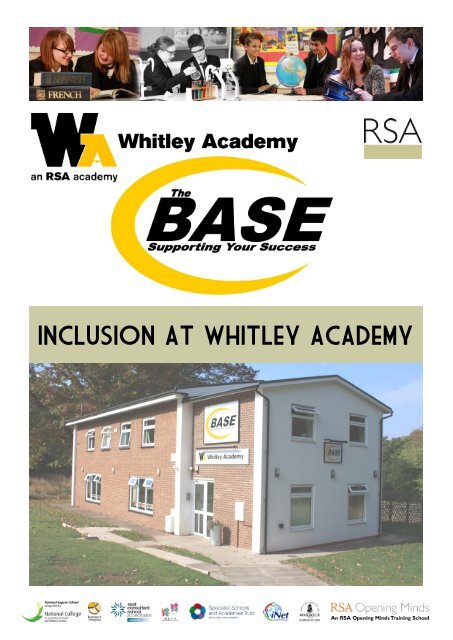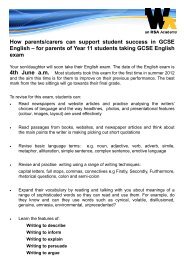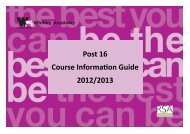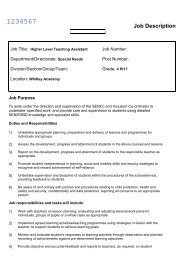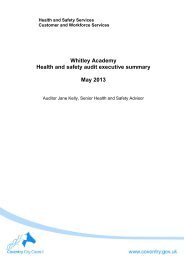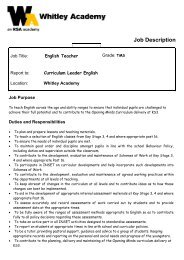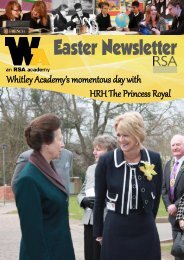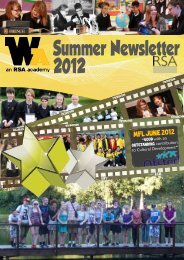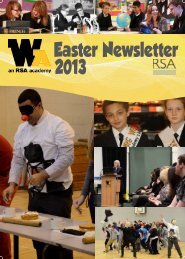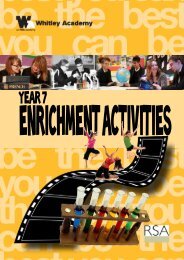Please download our full brochure for more ... - Whitley Academy
Please download our full brochure for more ... - Whitley Academy
Please download our full brochure for more ... - Whitley Academy
You also want an ePaper? Increase the reach of your titles
YUMPU automatically turns print PDFs into web optimized ePapers that Google loves.
Inclusion at <strong>Whitley</strong> <strong>Academy</strong><br />
www.whitleyabbey.com
The Base provides all kinds of support <strong>for</strong> <strong>Whitley</strong> Students and their parents. We are a team of mentors,<br />
learning support case workers, counsellors, teaching assistants, youth workers and home/school liaison<br />
officers.<br />
We work with a rage of students with a range of needs with the aim to enable and empower them to be the<br />
best that they can be.<br />
Everyone at some point may need a bit of extra support and at The Base we aim to provide that personalised<br />
support. The Inclusion Team are made up of non teaching staff allowing us to deal with concerns and<br />
problems quickly and efficiently. We use preventative measures and early interventions to promote good<br />
mental health, emotional well being and a positive attitude so that students achieve their <strong>full</strong> potential.<br />
The following groups run over a 6 week period:<br />
Anger management<br />
Motivation - raising attitude to learning<br />
Social Skills<br />
Healthy Well being<br />
Attendance Support<br />
Appropriate Behavi<strong>our</strong><br />
Raising Self Esteem<br />
Staying Safe<br />
Transition<br />
1-1 work will vary in content but be based around motivational coaching. We also have a dedicated team of<br />
volunteer counsellors.<br />
At present the following people take up these positions:<br />
Susie Elton<br />
Inclusion Coordinator<br />
Sally Allen<br />
Inclusion Coordinator<br />
Helen Trivedi<br />
Home/School Liaison Officer<br />
Alex Buff<br />
Learning Mentor<br />
Julie Parsons<br />
Teaching Assistant<br />
Kane Hudson Case Worker Year 7<br />
Helen Stanbrook Case Worker Year 8<br />
Paul Rule Case Worker Year 9<br />
Tracey Wheatley<br />
Case Worker KS4 (Years 10 &11)<br />
Nigel Moore<br />
Youth Worker<br />
Marie McCauley<br />
Youth Worker<br />
Sarah Whitehouse Counsellor<br />
Kay Harrison<br />
WRL Coordinator/Case worker KS4 (Years 10 &11)<br />
We hope you enjoy reading the following pages and we welcome y<strong>our</strong> comments. If you would like to know<br />
<strong>more</strong>, feel free to contact us at the school.<br />
Susie Elton (Mrs)<br />
Inclusion Co-ordinator<br />
Sally Allen (Miss)<br />
Inclusion Co-ordinator<br />
2
Breakfast Club at The Base<br />
Breakfast club at The Base is<br />
a great way to start y<strong>our</strong> day<br />
at <strong>Whitley</strong>. This is a chance to<br />
eat a variety of healthy<br />
breakfast foods and drink tea<br />
completely free of charge<br />
whilst you meet friendly staff<br />
and y<strong>our</strong> friends be<strong>for</strong>e y<strong>our</strong><br />
day at school starts.<br />
There are many activities to do<br />
from playing on the Wii fit to<br />
Oragami!<br />
We would love you see you<br />
there every day from 7:45am -<br />
8.30am<br />
3
Outline of Intervention<br />
Although you can never predict every eventuality, the majority of the Inclusion Teams work is<br />
proactive and targeted support.<br />
Managing Anger,<br />
Taking Responsibility<br />
Group <strong>for</strong>um, 1-2-1 support - Looking at anger triggers – why do we become angry<br />
Reactions to and appropriate methods of dealing with anger; time out etc. Managing<br />
<strong>our</strong> responses, recognising <strong>our</strong> emotions and learning how to manage them effectively<br />
to cope better under difficult circumstances, take responsibility; actions and consequences<br />
Managing Behavi<strong>our</strong><br />
Group <strong>for</strong>um, 1-2-1 support - Actions and consequences of behavi<strong>our</strong>.<br />
Causes of inappropriate behavi<strong>our</strong>, why do we behave badly<br />
Benefits of managing behavi<strong>our</strong> effectively and rewards; raised self esteem<br />
and confidence. Peer pressure. Learn to compromise. Acceptance, taking responsibility<br />
Appropriate Behavi<strong>our</strong><br />
Group <strong>for</strong>um, 1-2-1 support - Staying safe, appropriate relationships,<br />
environmental and personal influences, peer pressure, learn to say NO! Appropriate<br />
boundaries – what age should we be allowed to hang out Peer pressure and<br />
relationships. Acceptance of rules and boundaries<br />
Strictly Stress<br />
Group <strong>for</strong>um, 1-2-1 support - What is stress Stressful situations and<br />
environments and methods of dealing with them appropriately, recognising and<br />
removing <strong>our</strong>selves from stressful situations; look at alternative methods; exercise<br />
and healthy eating, relationships.<br />
Friendship Groups,<br />
Social Skills<br />
Group <strong>for</strong>um - Forming friendships, appropriate friendships;<br />
Recognising benefits of relationship building, being aware of inappropriate friendships,<br />
people skills, peer pressure, learning, appropriate role models; speaking skills, learn to<br />
be <strong>more</strong> assertive… recognising different personalities, learn to compromise.<br />
New hobbies and social interaction<br />
Attendance Support,<br />
Aim to be there<br />
Targeted attendance support, Causes and Consequences of truanting.<br />
Parental involvement and support. Academic achievement.<br />
EWO and home/school liaison support, realistic and achievable target setting.<br />
Look at school anxiety and refusal, relationships with students and staff.<br />
Strategies to support students and parents…<br />
Raising Self Esteem<br />
Group <strong>for</strong>um, 1-2-1 support - Confidence building, Learning to cope in situations,<br />
Have a voice! Believe in y<strong>our</strong>self, sharing emotions and active discussion, being<br />
y<strong>our</strong>self and proud of it! Recognising strengths and weaknesses and learning to<br />
embrace them, celebrating individuality, learning to compromise<br />
Self Awareness<br />
Group <strong>for</strong>um, 1-2-1 support – Age appropriate - Staying safe, changing bodies,<br />
personal hygiene, sexual awareness, confidence and self esteem, appropriate role<br />
models. Acceptance of rules and boundaries, environmental and social influences.<br />
Healthy Well Being<br />
Group <strong>for</strong>um, 1-2-1 support. What does it mean to be safe Do you always feel safe<br />
We also do joint delivery of some programmes with Youth Service, VIBES (branch of Mental<br />
Health) SHADOW (sexual health and drugs outreach work) If you would like support, please come<br />
and see Mrs Elton, miss Allen, or y<strong>our</strong> LSCW.<br />
4
Learning Support Caseworkers<br />
Kane Hudson<br />
As a Learning<br />
Support<br />
Caseworker, I<br />
am in the<br />
position to<br />
oversee the<br />
emotional and<br />
physical wellbeing<br />
of students<br />
in school in year 7. The work varies daily and<br />
each day presents with its own rewards and<br />
challenges. I have a good relationship with<br />
the students and their parents/carers; it is my<br />
role to ensure each student feels they have<br />
someone consistent and reliable to turn to in<br />
times of difficulty as well as participating in all<br />
aspects of school life.<br />
Paul Rule Year 9<br />
The level of<br />
commitment I<br />
have to helping<br />
challenging and<br />
disengaged<br />
student’s stems<br />
from my personal<br />
experiences<br />
coming from a<br />
single parent family, understanding how<br />
crucial intervention and guidance is at this<br />
stage of young people’s lives, enabling them<br />
to make positive contributions to their<br />
education and achieve their <strong>full</strong> potential. The<br />
intervention strategies I will be implementing<br />
consist of mentoring, group work and<br />
academic support.<br />
Helen Stanbrook<br />
Year 8<br />
Some of <strong>our</strong> students<br />
may not on the<br />
surface seem to have<br />
any needs but one<br />
incident can trigger<br />
off a different<br />
issue. An issue of<br />
bullying/name calling<br />
made a student very upset and withdrawn one<br />
afternoon. When she was given a friendly ear to<br />
listen to, it was clear she has little or no<br />
conservation at home and no outlet at school to<br />
talk about issues she may be facing on a daily<br />
basis (no immediate friends). All she requires is<br />
a friendly face she can talk to about how her<br />
week has gone and will just listen and take her<br />
seriously. She seems happier around school<br />
and I am trying to enc<strong>our</strong>age her to make a<br />
friend with another student who herself is very<br />
quiet. I have let her show me what she enjoys<br />
doing at home e.g knitting and try to teach me to<br />
do it – Not much of a success!!! Sometimes it is<br />
easy to <strong>for</strong>get the quiet students that just get on<br />
with school and cause no bother but they<br />
deserve <strong>our</strong> time as well.<br />
5
Tracey Wheatley<br />
I have two roles<br />
within school, as a<br />
Learning Support<br />
Caseworker <strong>for</strong><br />
KS4 and as the<br />
Looked After Child<br />
Co-ordinator.<br />
In my Caseworker role I monitor attendance,<br />
behavi<strong>our</strong> and academic progress. I make<br />
sure pupils arrive to school on time each day<br />
and to their individual lessons. I also support<br />
their learning in some lessons and provide<br />
mentoring support <strong>for</strong> pupils where needed.<br />
It is important that I get to know the pupils,<br />
understand all their individual needs, develop<br />
a positive relationship with them and their<br />
parents and carers, and ensure they<br />
progress and fulfill their potential within<br />
school.<br />
I support the role of their tutor and provide<br />
them with another option that they can go to<br />
if they have any problems or issues in<br />
school.<br />
I also try to ensure that parents and carers<br />
are <strong>full</strong>y in<strong>for</strong>med about progress and any<br />
issues which could impact on their learning.<br />
Kay Harrison<br />
Work Related<br />
Learning<br />
Coordinator<br />
I coordinate<br />
programmes of work<br />
related learning that<br />
are delivered at<br />
various training<br />
centres and colleges in Coventry and<br />
Warwickshire.<br />
As part of the KS4 curriculum, many of <strong>our</strong><br />
students have the opportunity to study a<br />
vocational or skill based subject <strong>for</strong> one day<br />
each week. All the qualifications are nationally<br />
recognised and provide opportunities <strong>for</strong><br />
progression into further education or<br />
employment. The work related and vocational<br />
subjects include Construction, Engineering,<br />
Motor Vehicle Maintenance, Early Years Child<br />
Care, Hair and Beauty, and many <strong>more</strong>.<br />
As well as supporting <strong>our</strong> students to succeed<br />
in their chosen subject, I also work with<br />
students to improve behavi<strong>our</strong>, attendance<br />
and help to remove barriers to learning.<br />
As the Looked after Child Coordinator I work<br />
closely with all <strong>our</strong> looked after children and<br />
all the other services and external agencies<br />
involved with that child. It is my responsibility<br />
to ensure that I have regular contact with<br />
them, and plan any interventions they<br />
require. I monitor their attendance,<br />
attainment and progress and ensure every<br />
child has a Personal Education Plan, and<br />
that regular PEP meetings take place. It is<br />
important that I monitor their well being and<br />
ensure he or she does not have any low self<br />
esteem problems or have problems<br />
developing or keeping relationships with their<br />
peers or adults.<br />
6
Mentoring<br />
Mentoring at The Base is invaluable. They are here to sort out any problems students may<br />
have. Parents may phone up and refer their child to a Mentor if they wish them to have help<br />
with their studies or with behavi<strong>our</strong>/motivation, or students themselves may ask to have some<br />
mentoring. If a students Attitude to Learning Score drops they may be referred to a Mentor to<br />
try and boost their levels up again.<br />
Julie Parsons<br />
Part of my role at<br />
The Base is mentoring<br />
as well as<br />
providing support<br />
<strong>for</strong> classes at<br />
school. I mentor<br />
individuals and<br />
group work at<br />
The Base offering support, enc<strong>our</strong>agement<br />
and building upon their self esteem so that<br />
they can achieve their <strong>full</strong> potential. I have<br />
worked with Student A from year 7 when he<br />
worked in the learning support unit, seeing<br />
incredible changes in him from underachieving,<br />
being distracted and displaying<br />
some behavi<strong>our</strong> problems. He is now in<br />
year 9 and in a high achieving set and engaging<br />
well in mainstream school. He has<br />
developed into a <strong>more</strong> mature contented<br />
student and wants to achieve positive future<br />
goals.<br />
Helen Trivedi<br />
There are many<br />
reasons why some<br />
students do not<br />
always reach their<br />
<strong>full</strong> potential - some<br />
of these reasons<br />
may be related to<br />
their health or<br />
emotional well-being. The Well Being mentor<br />
works with students to promote positive<br />
lifestyle choices e.g. healthy eating, exercise,<br />
and self-care skills, and enc<strong>our</strong>ages them to<br />
take these options and ideas home to their<br />
family. By removing these particular barriers to<br />
learning that effect students inside and outside<br />
school, we can work to support the student to<br />
reach their <strong>full</strong> potential.<br />
Nigel Moore<br />
and Marie<br />
McAuley are<br />
Youth Workers<br />
at The Base.<br />
They support the<br />
work of the Inclusion<br />
Team at<br />
The Base doing groups, 1-1 work, Parenting<br />
C<strong>our</strong>ses, and work within the community.<br />
Nigel supports and leads on CAFS with the<br />
aim to put a package of support together<br />
<strong>for</strong> families should they need one.<br />
Alex Buff<br />
I am a learning mentor<br />
and provide support to<br />
identified students<br />
through 1:1 mentoring<br />
and group work. I aim<br />
to remove their<br />
barriers to learning and<br />
in turn, help them to<br />
reach their <strong>full</strong><br />
potential. I regularly liaise with me mentee’s to<br />
ensure they feel supported and try hard to<br />
maintain positive relationships with their<br />
families/parents/carers.<br />
7
Sally Allen<br />
Inclusion<br />
Co-ordinator<br />
Part of my role is to<br />
coordinate the programmes<br />
running at<br />
The Base I also provide<br />
support to <strong>our</strong><br />
students through 1:1<br />
mentoring and<br />
group work.<br />
Child A had a lot of<br />
barriers to learning which significantly affected<br />
their ability to be successful at<br />
school. Child A’s home life was transient<br />
and chaotic, and there was limited support<br />
from Child A’s parent/carer. There was Police<br />
and Social Services involvement with<br />
the family as Child A would often run away<br />
from home. Child A’s attendance to school<br />
was poor (54%), meaning that Child A<br />
missed huge chunks of her learning and<br />
found it difficult to access the work when<br />
she did come into school. Child A also displayed<br />
challenging behavi<strong>our</strong> and lacked in<br />
social skills. All of theses barriers to learning<br />
meant that Child A was at high risk of<br />
permanent exclusion and needed lots of<br />
support.<br />
I was Child A’s mentor and had weekly sessions<br />
with her in which we covered appropriate<br />
behavi<strong>our</strong>, anger management, making<br />
good choices, attendance, social skills,<br />
positive relationships and issues at home.<br />
Child A was on a Success Card with three<br />
personalised targets which she would show<br />
to me at the end of each day. Good cards<br />
meant personalised rewards!<br />
Child A was also put into a smoking<br />
cessation group <strong>for</strong> one term to explore<br />
addiction and the effects of smoking. Child A<br />
had 8 sessions a week of extra literacy and<br />
numeracy at The BASE to help her ‘catch up’<br />
with work she’d missed due to her poor<br />
attendance. This was really beneficial <strong>for</strong><br />
Child A who was then able to access the<br />
work in lessons reducing the amount of<br />
challenging behavi<strong>our</strong> in class. Child A<br />
started attending Breakfast Club which<br />
meant she was able to start the day off in a<br />
positive way and this also stopped lateness<br />
to morning lessons. I regularly liaised with<br />
Child A’s social worker and parent/carer to<br />
maintain good relationships and keep them<br />
in<strong>for</strong>med with Child A’s progress. I invited<br />
Child A’s parent/carer to an in<strong>for</strong>mal coffee<br />
morning at The BASE and as a result they<br />
eventually signed up <strong>for</strong> a Positive Parenting<br />
Programme.<br />
Child A’s attendance went up to 92% and her<br />
behavi<strong>our</strong> improved significantly both in and<br />
out of school. She was able to use the social<br />
skills she had learnt to <strong>for</strong>m some solid<br />
friendships and her confidence grew and<br />
grew. Ultimately, Child A knew that she was<br />
cared about at school and felt safe. Without<br />
the support of the Inclusion Team I believe<br />
that Child A wouldn’t have been able to<br />
succeed at school to the degree that they<br />
did.<br />
It gives me great job satisfaction knowing<br />
that I am part of a team that helps to remove<br />
the barriers to learning <strong>for</strong> many young<br />
people and consequently this allows them to<br />
reach their <strong>full</strong> potential. Often it’s the little<br />
things that make a big difference, and<br />
sometimes you have to think outside the box<br />
and go that extra mile <strong>for</strong> <strong>our</strong> students.<br />
8
What is<br />
Counselling<br />
A Young person’s<br />
guide.<br />
Clare Welch<br />
“What can a counsellor offer me”<br />
A counsellor can offer you the time and space that<br />
you need in order to talk about y<strong>our</strong> problems. They<br />
won’t talk at you or tell you what they think you<br />
should do. They give you the time that you need to<br />
talk about issues that are affecting you so that you<br />
can reflect and decide <strong>for</strong> y<strong>our</strong>self what is the best<br />
solution. Counsellors can help you explore the<br />
options that are available <strong>for</strong> you. They won’t try to<br />
change y<strong>our</strong> behavi<strong>our</strong> or thoughts only you can do<br />
that.<br />
“Will everything be private and<br />
confidential”<br />
The counsellor that you see will go through an<br />
agreement with you on y<strong>our</strong> first meeting. This may<br />
sound scary but the counsellor will answer any<br />
questions that you may have regarding this.<br />
Basically, the agreement will state that everything<br />
that you say to y<strong>our</strong> counsellor will be completely<br />
private, unless you say something which indicates<br />
that you or someone else is in danger of harm. In<br />
this case, y<strong>our</strong> counsellor would have to pass this<br />
in<strong>for</strong>mation on to Mrs Elton, but they would always<br />
talk you about this first. This helps to keep you and<br />
the counsellor safe.<br />
“Will my parents/carers have to know that<br />
I’m coming to counselling, and will they<br />
know what we talk about”<br />
In most cases it would be nice if you could tell y<strong>our</strong><br />
parents/carers that you are seeing a school<br />
counsellor, but we understand that sometimes it isn’t<br />
easy to do this. The only reason y<strong>our</strong> parents/carers<br />
may be told about something you said in counselling<br />
would be if you or someone else were in danger of<br />
harm. But y<strong>our</strong> counsellor would always talk to you<br />
about this first, be<strong>for</strong>e they passed on any<br />
in<strong>for</strong>mation.<br />
“Will my teachers need to know that I’m<br />
coming to counselling”<br />
The counselling will take place during school h<strong>our</strong>s<br />
so you will need to be excused from y<strong>our</strong> lessons.<br />
Miss Allen or Mrs Elton will tell y<strong>our</strong> teacher that you<br />
have a weekly appointment at The BASE so you will<br />
need to be excused from those lessons. Y<strong>our</strong><br />
teacher will not be told that you are coming to The<br />
BASE <strong>for</strong> counselling.<br />
“If I don’t like counselling what do I do”<br />
If you decide that you no longer want to see y<strong>our</strong><br />
counsellor <strong>for</strong> what ever reason no one is going to<br />
question you or <strong>for</strong>ce you to go. All you need to do<br />
is tell Miss Allen, Mrs Elton or y<strong>our</strong> counsellor. We<br />
might ask you to go one last time just to finish off<br />
y<strong>our</strong> counselling properly, but that is up to you. If<br />
you changed y<strong>our</strong> mind and decided you wanted<br />
counselling again at any point, all you would have to<br />
do is tell Miss Allen or Mrs Elton and they would put<br />
you back on the waiting list <strong>for</strong> counselling.<br />
“How long will I need to be there <strong>for</strong>”<br />
You will have one session of counselling a week.<br />
Each counselling session will last <strong>for</strong> 50 minutes<br />
(one period), and you will usually have y<strong>our</strong><br />
counselling at the same time every week.<br />
You can have counselling <strong>for</strong> as long as you feel<br />
you need it. Some people have counselling <strong>for</strong> just a<br />
couple of sessions, and some people have<br />
counselling <strong>for</strong> months and months! There is no<br />
‘right’ amount of time to have counselling <strong>for</strong>,<br />
because everybody is different.<br />
You may have <strong>more</strong> questions that you want<br />
answering as this is only a brief introduction to what<br />
we can offer you. If you want to ask any questions<br />
be<strong>for</strong>e starting counselling you can come to The<br />
BASE and ask <strong>for</strong> Miss Allen or Mrs Elton. We will<br />
try <strong>our</strong> best to answer any questions you may have!<br />
……………………………………………………….......<br />
Some things students that have said about<br />
counselling at The BASE…<br />
“I would recommend counselling to other<br />
people because it helped me a lot”<br />
“I could talk easily with my counsellor and felt<br />
she listened to what I said”<br />
“I was never judged”<br />
“My counsellor helped me to understand things”<br />
“She (a counsellor) gave me different ways of<br />
viewing the situation, helping me to understand<br />
<strong>more</strong> and feel better”<br />
9
Home/School<br />
Liaison Officer<br />
I provide support to the<br />
students to enable<br />
them to raise and<br />
maintain attendance,<br />
and to ensure that<br />
young people take<br />
advantage of their legal<br />
right to education, and there<strong>for</strong>e improve their life<br />
chances.<br />
I work with the Inclusion Team in removing the<br />
students barriers to attending school and supporting<br />
the young person.<br />
I often meet with young people <strong>for</strong> a chat to look<br />
with them at ways in which they might be able to<br />
improve their attendance and punctuality. I welcome<br />
any calls from parents/careers to discuss concerns<br />
they may have and look towards making positive<br />
change and avoid any risk of harm.<br />
The government expectation <strong>for</strong> attendance is 95%<br />
+, which is deemed to be the level of attendance<br />
that gives pupils the greatest opportunity to achieve<br />
the best of their potential in school both<br />
academically and socially. Anything less is a cause<br />
<strong>for</strong> concern, this concern may result in us contacting<br />
parents/carers either by letter, phone, home visit or<br />
invitation to an attendance meeting, where<br />
strategies <strong>for</strong> improvement are put in place.<br />
The Inclusion Team are a very positive way of<br />
helping y<strong>our</strong> child and y<strong>our</strong> family with difficulties<br />
you may be experiencing, is by undertaking a CAF.<br />
A CAF (Common Assessment Framework) is a new<br />
way of working with children and young people. It<br />
involves listening to you and y<strong>our</strong> child to find out<br />
y<strong>our</strong> child’s needs, and what is working well in y<strong>our</strong><br />
child’s life. An action plan, agreed with you and y<strong>our</strong><br />
child, is also put in place to make sure y<strong>our</strong> child<br />
gets the right sort of help. The CAF is voluntary –<br />
you and y<strong>our</strong> child can choose to be involved.<br />
How does it work<br />
If you and y<strong>our</strong> child agree, a worker will ask you<br />
and y<strong>our</strong> child some questions to find out what help<br />
and support y<strong>our</strong> child might need. This in<strong>for</strong>mation<br />
is recorded on a simple <strong>for</strong>m. You and y<strong>our</strong> child<br />
will agree what is put on the <strong>for</strong>m, and you will be<br />
given a copy of it.<br />
How will the CAF help my family<br />
The CAF exists to help you support y<strong>our</strong> child. It<br />
can lead to a quick solution or help to identify<br />
extra support if needed. The CAF will ensure<br />
that everyone involved with y<strong>our</strong> child – such as<br />
teachers and other professionals – work together<br />
to support you and y<strong>our</strong> child. The CAF will help<br />
y<strong>our</strong> child receive the right support at an early<br />
stage be<strong>for</strong>e their needs increase.<br />
When is the CAF used<br />
The CAF can be used if you or someone who<br />
works with y<strong>our</strong> child would like y<strong>our</strong> child to<br />
receive extra support. It will help to identify y<strong>our</strong><br />
child’s additional needs, and other workers<br />
required to support y<strong>our</strong> family. Only workers<br />
who need to know about y<strong>our</strong> child will share<br />
y<strong>our</strong> child’s in<strong>for</strong>mation. If a number of people<br />
are providing support to y<strong>our</strong> child, one of these<br />
people may be appointed as a ‘lead<br />
professional’. This person will keep you in<strong>for</strong>med,<br />
listen to y<strong>our</strong> views and support you.<br />
We are aware that there are many reasons<br />
which can affect school attendance and we<br />
do <strong>our</strong> very best to offer support and advice<br />
to parents/carers and young people to avoid<br />
prosecution proceedings.<br />
However, in the event of ongoing unauthorised<br />
absence from school when strategies set up <strong>for</strong><br />
improvement have failed, the Education Welfare<br />
Service has no alternative under Section 444 of<br />
the Education Act 1996 to prosecute. <strong>Please</strong><br />
note that school also may decide to initiate a<br />
Fixed Penalty Notice and apply to the Local<br />
Authority with respect to any parents whose child<br />
has 10 or <strong>more</strong> sessions of unauthorised<br />
absence in any 5-week period.<br />
It is also important to recognise that pupil<br />
absence during term time can seriously disrupt a<br />
pupils learning. We would there<strong>for</strong>e urge all<br />
parents to avoid booking a family holiday in term<br />
time. In certain circumstances at the discretion<br />
of the head teacher, the head teacher may<br />
choose to grant leave of absence of up to 10<br />
days in any calendar year.<br />
We appreciate the opportunity to work within the<br />
Inclusion Unit at <strong>Whitley</strong> Abbey Business &<br />
Enterprise College and be a part of the wide<br />
range of opportunities and care that they offer to<br />
their young people.<br />
10
Every Child deserves to:<br />
Be healthy<br />
Stay safe<br />
Enjoy and achieve<br />
Make a positive contribution<br />
Achieve economic well-being<br />
Common Assessment Framework<br />
“The Common Assessment Framework (CAF) is a new<br />
way of working with children and young people who need extra<br />
support. It is an action plan, agreed with parents and their child to<br />
make sure their <strong>full</strong> potential is met as well as their basic needs;<br />
because Every Child Matters“<br />
CAF Trained Staff at <strong>Whitley</strong> <strong>Academy</strong><br />
Susie Elton<br />
Sally Allen<br />
Nigel Moore<br />
Alex Buff<br />
Helen Trivedi<br />
Marie Power<br />
Helen Stanbrook<br />
Paul Rule<br />
Kane Hudson<br />
If you feel a student in any of y<strong>our</strong> classes requires a CAF please speak with<br />
Susie Elton<br />
A CAF is used to help ensure basic needs of a Young Person are met BUT if a child<br />
is thought to be at risk of harm, usual safeguarding procedures must be followed.<br />
We also carry out CAF’s - have a look at the next page<br />
to see if this would be good <strong>for</strong> you and y<strong>our</strong> family...<br />
11
Community events<br />
We host regular community events, organised by the Inclusion team. The aim of these events is to<br />
engage parents in some enjoyable activities at school, and often give family’s time to have some fun<br />
together. Our events range from simple coffee afternoons, with free tea, coffee and sandwiches with the<br />
opportunity to meet some external support agencies, then to invite only events <strong>for</strong> targeted families, and<br />
whole school family fun events.<br />
We try and plan these events to incorporate different activities, including crafts and manicures, which<br />
everyone can enjoy, although participation is optional, it is enc<strong>our</strong>aged! These events open a gateway <strong>for</strong><br />
parents to in<strong>for</strong>mally discuss their child’s progress, and meet some of the staff that support them. It is<br />
hoped that by attending these events parents will feel confident approaching school if/when issues arise.<br />
We also hope to help parents link with useful, relevant support agencies or in<strong>for</strong>mation that could<br />
improve their current situation, which will help to improve the chances of <strong>our</strong> students at <strong>Whitley</strong><br />
<strong>Academy</strong>.<br />
14
Circle Time<br />
Circle time is a way students get to voice<br />
their opinion on a variety of topics in a<br />
safe environment. It is led by a trained<br />
member of staff and occasionally students<br />
ask whether they can lead it. The only<br />
person allowed to talk is the one holding<br />
the talking piece. A normal circle time<br />
begins with each students in turn saying<br />
out of 10 how their week has been. When<br />
the talking piece has been round once,<br />
the teacher may want to ask another<br />
question about why they said that<br />
number. This often leads on to students<br />
talking about an incident at school they<br />
may have found difficult to handle. Pupils<br />
then can offer advice/support/help to their<br />
peers. Target setting through circle time<br />
has proved to be really rewarding.<br />
Students are enc<strong>our</strong>aged to keep account<br />
to their peers <strong>for</strong> how they are managing<br />
with achieving their target.<br />
Circle time is about getting the pupils to<br />
reflect on their own per<strong>for</strong>mance in terms of<br />
behavi<strong>our</strong>, academic success and any other<br />
factors. It also enc<strong>our</strong>ages them to reflect on<br />
each other’s per<strong>for</strong>mance and offer<br />
constructive criticism in some cases and<br />
honest praise in others. In 7C it had made a<br />
difference as the barrier of the teacher being<br />
the man or woman stood at the front of the<br />
class is broken down physically and subconsciously.<br />
It had made the group <strong>more</strong><br />
honest and open and improved their maturity.<br />
Finally, a number of students really look<br />
<strong>for</strong>ward to circle time as a refreshing change<br />
from normal lessons.<br />
A pupils view:<br />
“We do circle time every Tuesday. I look<br />
<strong>for</strong>ward to it because it helps me know my<br />
friends <strong>more</strong> and teaches us how to work<br />
together. We are all honest with each<br />
other and once someone said to me how I<br />
had been better in my lessons - I liked to<br />
hear that from someone in my class. It<br />
enc<strong>our</strong>aged me to do even better.”<br />
Circle Time Rules<br />
1) Only talk if you have the talking piece<br />
2) Anything said in the circle stays in the circle<br />
3) Speak from the heart<br />
4) No put downs<br />
15
Supporting<br />
the Needs of<br />
Looked After<br />
Children<br />
Who are ‘looked<br />
after children’<br />
The term 'looked<br />
after' refers to children who are under 18 and<br />
have been provided with care and<br />
accommodation by children's services. Often<br />
this will be with foster carers, but some<br />
looked after children might stay in a<br />
children's home or boarding school, or with<br />
another adult known to the parents and<br />
children's services.<br />
The aim is to ensure the health and safety of<br />
looked after children, who often come from<br />
families who have experienced extreme<br />
hardship and upheaval, whilst working as<br />
closely as possible with the birth parents.<br />
Any disruption to home life often means that<br />
looked after children do not achieve their<br />
academic potential. Children's services also<br />
works to make sure the educational needs of<br />
each child are met.<br />
Why do children become ‘looked after’<br />
A large number of these children coming into<br />
care will have a history of physical, sexual or<br />
emotional abuse. Some may have suffered<br />
the death of a parent, or have parents who<br />
can’t look after them properly because of<br />
illness. Others may have disabilities and<br />
many different needs. A very small number<br />
are in care because of crimes they have<br />
committed.<br />
Many children and young people in care<br />
have experienced great personal upheaval.<br />
This disruption to home life and education<br />
can prevent them from reaching their<br />
academic potential.<br />
Children and young people in care often<br />
make up a large percentage of those that are<br />
excluded from school, fail to attend school,<br />
suffer from emotional behavi<strong>our</strong>al difficulties<br />
or have special educational needs.<br />
There are significant gaps between what<br />
they and their class mates achieve. Special<br />
measures are needed to overcome this<br />
problem.<br />
Personal education plans<br />
To help children in care to do better at school,<br />
teachers and social workers work together to<br />
prepare an individual plan <strong>for</strong> each child.<br />
These are called 'Personal education<br />
plans' (PEP).<br />
All looked after children of primary and<br />
secondary school age have a PEP. The child<br />
or young person meets with their social<br />
worker, carer and school representative to<br />
discuss how they are getting on at school and<br />
what could be done to help them achieve their<br />
academic potential.<br />
A PEP can help to raise the child’s self esteem<br />
by identifying their strengths and abilities and<br />
learning to build on them. PEPs can highlight<br />
any problem areas <strong>for</strong> the child and find ways<br />
of overcoming them. A pre-school PEP is also<br />
being developed to identify the learning needs<br />
of children under five.<br />
Bringing together all the key people involved in<br />
this way can make PEPs very effective in<br />
initiating positive change.<br />
Designated teachers<br />
All schools have a designated teacher <strong>for</strong><br />
looked after children, who monitors their<br />
per<strong>for</strong>mance and attendance and is normally<br />
the person who attends the PEP meetings and<br />
reviews. They provide day to day educational<br />
support and advice <strong>for</strong> the child. Our<br />
designated teachers are Mrs Wheatley and Mr<br />
Rex <strong>for</strong> this academic year - Sept 2011-July<br />
2012<br />
Setting targets at schools<br />
In addition to PEPs, the School Improvement<br />
Service team work closely with schools in<br />
setting achievable academic targets <strong>for</strong> all<br />
looked after children.<br />
16
The Base Res<strong>our</strong>ce List<br />
These are some of the curriculum's we use:<br />
Improving Behavi<strong>our</strong><br />
Anger Management<br />
Learning Mentor Res<strong>our</strong>ce Book<br />
(covers motivation/anger/loss/stress/attitude/family breakdown etc)<br />
Personal Development<br />
Welcome to Friendship<br />
Working with challenging behavi<strong>our</strong><br />
Helping you manage grief fear and anger<br />
Pregnancy book<br />
Alcohol alert<br />
Emotional Survival<br />
Anger Control Activities<br />
Getting There (transition)<br />
Personal Safety curriculum<br />
Making the best of me<br />
Strictly stress<br />
Facts of life<br />
Muddles puddles and sunshine (bereavement)<br />
On the booze, again<br />
Stoned<br />
Peer Mentoring<br />
Thinking out of the box<br />
The big book of blobs<br />
Quality Circle Time<br />
17
“I went down to The Base in year 7<br />
<strong>for</strong> anger management-it calmed<br />
down my behavi<strong>our</strong>”<br />
In year 8 I went down to The Base <strong>for</strong><br />
one to one with miss ********* It has<br />
helped me stay in lessons and not sent<br />
out”<br />
“I have miss ******* every <strong>for</strong>tnight. It<br />
does help because I can express my<br />
self and tell her everything that goes<br />
on in the classroom”<br />
“The Base has helped me to<br />
concentrate and to be<br />
motivated”<br />
“I find it easy to talk to any of the teachers<br />
at anytime as I know they will help and this<br />
helps as I always know I have support”<br />
“I went to The Base to improve my confidence,<br />
it helped me a lot and now I put my hand up<br />
<strong>more</strong> in class”<br />
“I think that at The Base it is good<br />
because you have some one to<br />
talk to about y<strong>our</strong> problems”<br />
“I have been to The Base <strong>for</strong> 4 different<br />
c<strong>our</strong>ses. I have been there <strong>for</strong> anger<br />
management, Moving Forward, Mentoring<br />
and Raising my Attitude to my Learning,<br />
and it has helped out a lot. I don’t get<br />
angry as much”<br />
“Down The Base I worked<br />
with Miss ********. It helped me<br />
because you have someone to<br />
talk to”<br />
“When I went to The Base I had a class with<br />
miss ******** it was about my confidence and it helped a lot “<br />
18


